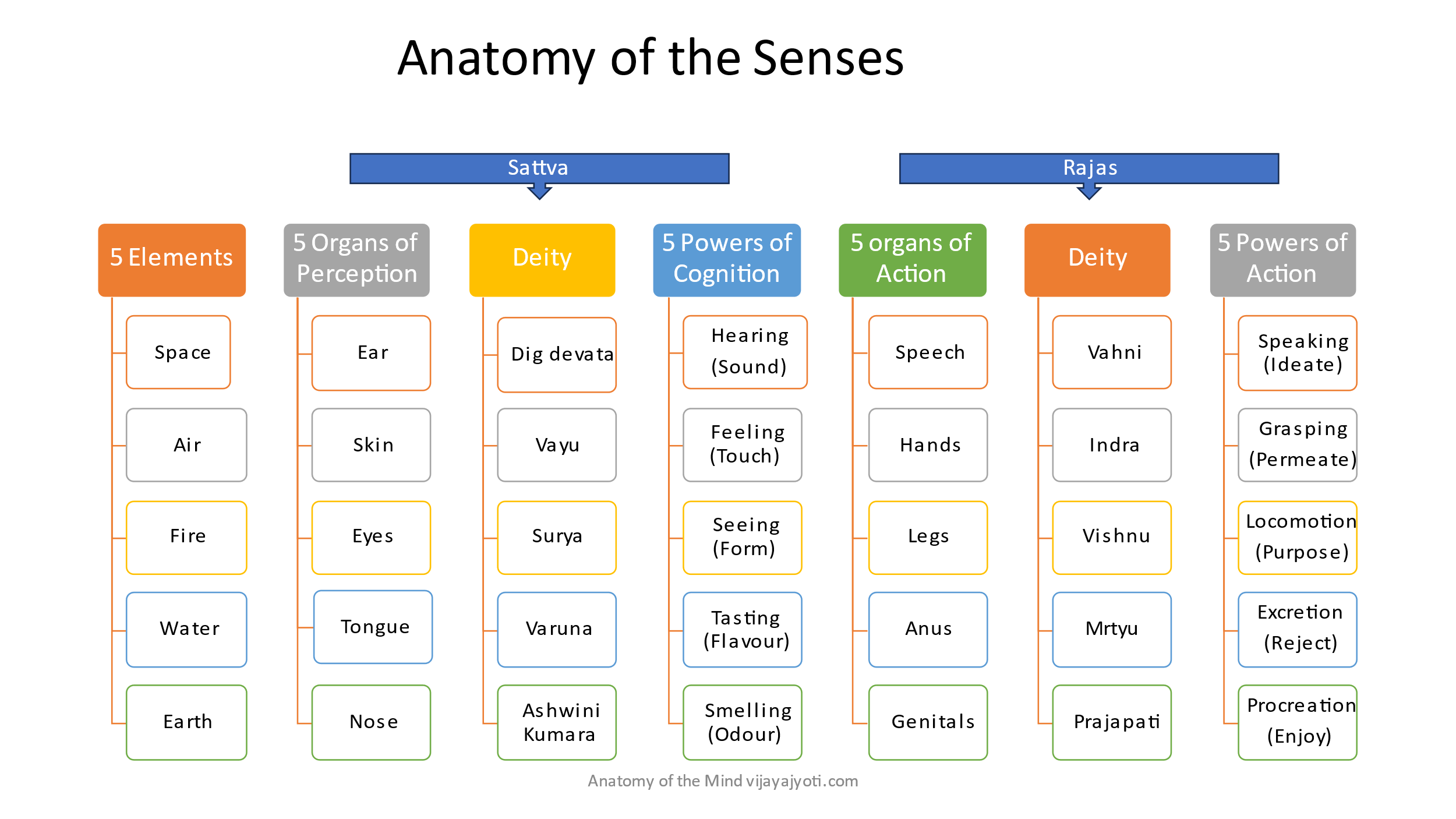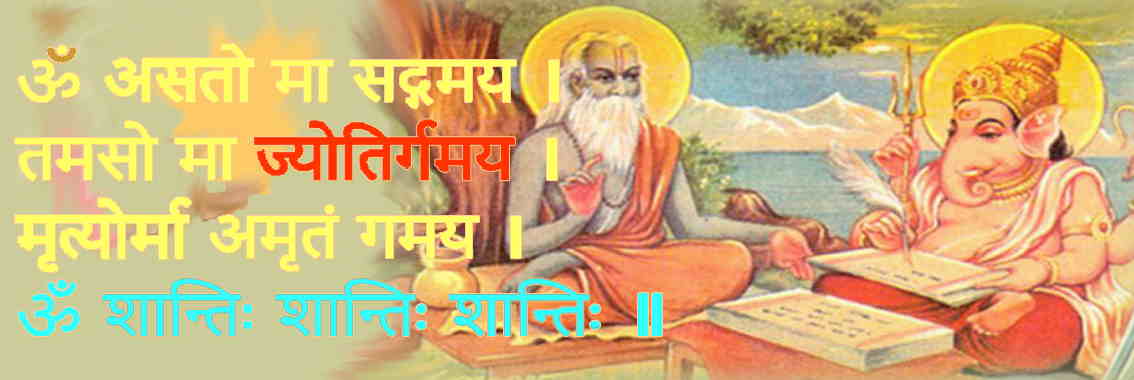Dama – Austerity in use of the senses
`व्यां वेदव्यासाय नमः
vyāṁ vedavyāsāya namaḥ
Guru Purnima is the occasion to express gratitude to our Guru, mentors and teachers who are illumining our path. This year, it falls on July 3rd. Four years ago, on this same occasion I started writing about the importance of observing “sādhana catuṣṭaya” or the four-fold qualification given in Tattva Bodha that facilitates spiritual learning. Every year I explore one quality in-depth for my development as my offering on this day. This year I want to explore dama (one of the qualities of śat sampat or six virtues that forms a part of the sādhana catuṣṭaya) – the restraint of the five sense organs– ear, skin, eyes, tongue and nose; and the five organs of actions – speech (tongue), hands, legs, anus and genitals.
What is Dama?
As you may well know, the senses are the instruments we use to interact with the world. When the senses are stronger than the mind, we become externally focussed. Dama facilitates the loosening of the hold, the senses have on the mind, thus allowing the mind to lead the senses by relying on the higher reasoning power. For example, in this age of internet and social media, we are constantly watching and hearing content from videos and emailing or texting. Then we are forced to process all this information and act on all that we make it mean. This is very exhausting. Not surprisingly, there is a threat that our dreams and ambitions are not guided by our higher reasoning but by the external media and possibly the notion of outdoing what others are doing.
In the same way, if our taste buds are too strong, we tend to gravitate towards eating what we like, and this can make us unhealthy. Further, if our speech is hurried and without reflection, we can hurt others and ourselves. Similarly excessive contact with others can disturb the certain amount of withdrawal from surroundings that spiritual pursuits demand. Adi Śaṅkarācārya in his classical work Viveka Cūḍāmaṇī, provokes our thoughts through this verse as to how we can be manipulated to our fall by the attachment to the senses.

शब्दादिभिः पञ्चभिरेव पञ्च
पञ्चत्वमापुः स्वगुणेन बद्धाः ।
कुरङ्गमातङ्गपतङ्गमीन
भृङ्गा नरः पञ्चभिरञ्चितः किम् ॥ ७६ ॥
śabdādibhiḥ pañcabhireva pañca
pañcatvamāpuḥ svaguṇena baddhāḥ |
kuraṅgamātaṅgapataṅgamīna
bhṛṅgā naraḥ pañcabhirañcitaḥ kim || 76 ||
The deer, the elephant, the moth, the fish and the honey-bee – these five, meet death, because of their bondage to one five senses, viz. sound etc., What then is the condition of a person who is attracted to all these five.
The deer is attracted to sound and hunters mimic their sound to get them close. The elephant is led to captivity by a trained elephant as it follows the other blindly for the want of touch. The moth perishes as it is attracted to the flame as the fish to the bait and the bee to the smell thereby getting trapped inside a flower overnight. The over-use of any sense organ is harmful to the harmony and the balance of the eco-system of our bodies. Even for those with practical and material goals, command of their senses is primary. The Greeks called this virtue of temperance. In the words of the Roman emperor Marcus Aurelius “the rational faculty exists to understand the appetites, rather than be used by them”.
The workings of the mind have been explained in Kaṭhopaniṣad by using the metaphor of a chariot, where the horses are the senses and the mind (mānas) the reins and the charioteer the reasoning power (buddhi). The passenger of the chariot is the Self (ātma). When the horses (senses) get out of control, we are derailed and cannot reach our destination.
Holding the reins steady is not easy at all. The driver must have the strength and skill to keep the horses going in the right direction. Verses 2.62-2.61 of the Bhagavad Gītā warns that the senses are so strong and turbulent, that they can forcibly carry the mind away even of a person endowed with discrimination and only those that can subdue their senses are endowed with Prajña – experiential wisdom.
To reign our senses, we must understand how they are yoked to the mind, therefore a deeper understanding of the anatomy of the senses is necessary.
Anatomy of the senses
From the Sāṅkhya philosophy, the senses emerge from the subtle and gross elements of the universe and interact with the three guṇas – sattva, rajas and tamas. The 5 elements in the order of creation from the subtlest to the grossest are space, air, fire, water and the earth. Space is the subtlest element of all it possesses only one attribute whereas the earth is the grossest element as it possesses all the five attributes of sound, touch, sight, taste and smell. From the sattva portion of the elements, the 5 organs of perceptions – ear, skin, eyes, tongue, and nose give us the 5 powers of cognition. From the rajasic portion of the elements, the 5 organs of actions – speech (tongue), hands, legs, anus and genitals bestow us the power to act – speak, grasp, move, reject and create. (See picture below). The tamas portion goes on to create the physical body and is not relevant to the discussion here.

The cognition gained from the sense organs are stored in the memory or citta. The mind propelled by these memories and dominated by the sense organs (in disregard to the intellect) constantly hankers to experience more of those memories that it considers as pleasurable through its organs of actions, while rejecting the experiences that are not pleasurable. This process re-enforces our current way of being, thus the disturbances in the elements existing within us (in the mind and the body) affecting the way the faculties are utilised are retained.
The planetary positions in the horoscope are not the reason for imbalances or inappropriate actions but merely indicate the nature and extent these imbalances exist within us. Imbalances are indicated by afflictions to the signs and the planets, excessive concentration of planets in one element or a weakness by having very little or an absence of representation of an element in a horoscope. It is only possible to remedy the imbalance if we become aware of them by adopting appropriate practices to direct the mind upward to the intellect.
The importance of Dama
We are familiar with cognition gained directly from using our mental faculties to assess a situation. This is essentially a top-down process. The somatic awareness (bottom-up) is gained from the states of bodies directly from the senses. When both processes co-exist, the awareness of self is more complete. Somatic awareness improves with the practice of dama and have more control over sense organs. For example, if we practice breath control regularly, then we can feel the anger arising in the body by observing how the breath is faster, shorter and heated (which is indicated by the blood too). This helps us in responding to a situation appropriately instead of reacting which comes from a programmed mental faculty (chitta or data bank).
We exert ourselves externally to acquire things to make us feel more happy or complete. In the process we may be challenged as promoting our agenda often bring the weakness of the mind to the forefront, which are then delivered through the senses. The weaknesses of the mind are called the śad ripu – six- fold weaknesses – desire, anger, greed, intoxication, delusion, and jealousy. Here, I want to share verse from Vairāygya Ḍiṇḍima of Adi Śaṅkarācārya where it is pointed that these weaknesses reside within us, constantly playing on our mind, forcing us to react and looting us of the peace and wisdom.
कामः क्रोधश्च लोभश्च देहे तिष्ठन्ति तस्कराः
ज्ञान रत्नो पहाराय तस्मत् जाग्रत जाग्रत।
kāmaḥ krodhaśca lobhaśca dehe tiṣṭhanti taskarāḥ|
jñānaratnāpahārāya tasmāt jāgrata jāgrata||
There lurk thieves in the frame (in the body) lust, anger and greed etc… to steal the jewel of thy wisdom. Therefore awake! awake!!
The practice of dama can be very useful to monitor self-behaviour and reduce reactions. That is why dama is one of the qualities enumerated in Chapter 16 of Bhagavad Gītā that stimulates divine behaviour. In the language of jyotiś, it is wise to pay attention to the 3rd house in the horoscope which shows agenda, acumen and means of acquisition while the 6th house shows the weaknesses of the mind.
Practice of Dama
The senses are tamed by the practice of pratyāharā , one of the limbs of the aṣṭāṅga yoga of the Pātānjali sutra. It is the vital first step where the senses are wilfully restrained from looking outward and trained to look upward to the intellect and ultimately the ātma.
At the first instance, we can start the practice in our daily lives by stopping our senses that are directed to harmful things such as watching excessively violent movies, as these can make our minds insensitive. What we watch is fodder to the mind which is often re-played at some point in our lives or in our dreams. These days, there is considerable strain on the eyes due to technology and constant use of media and technology that causes scattering of the mind. I find that imposing a ban on watching Netflix or social media for certain days or weeks is very healthy for me. I also do not read text messages or emails constantly and particularly closer to night-time as these are detrimental to the quality of sleep.
As our senses demand constant interaction, we can change our habits by the process of substitution by introducing newer habits that helps in re-wiring the memory. We can train the eyes even for a brief period to look at objects that make good impressions such as trees, birds and the sky to replace what is in the memory. Mauna or keeping quiet for certain hours or days helps in conserving energy and re-organising memory with respect to habitual patters of speaking. Listening to hymns brings the positivity of connection through engaging with the space element. Visualisation is also a powerful that can help us move away from old habits. Fasting helps in restraining mind as it stops in re-distributing food to the senses and is also good for changing the eating habits.
Pratyāharā is more beneficial when one has gained proficiency in breathing techniques after which one can also practice the mudras (hand gestures) to correct imbalances of tattvas. This practice has also more efficacy if we consciously keep good company (satsang).
Peace prayer
The practice of dama is not one for the light-hearted and re-directing the senses is not an easy task. Awareness is the key. Once we become aware that our senses are over-taking us, we can correct ourselves to rebalance and turn inward for guidance. I find this peace prayer from Atharva Vedā serves as a positive affirmation in my practice of dama.
| ॐ भद्रं कर्णेभिः शृणुयाम देवाः । | Om bhadraṃ karṇebhiḥ śṛṇuyāma devāḥ |
| भद्रं पश्येमाक्षभिर्यजत्राः । | bhadraṃ paśyemākṣabhiryajatrāḥ . |
| स्थिरैरङ्गैस्तुष्टुवागँसस्तनूभिः । | sthirairaṅgaistuṣṭuvāgaṃsastanūbhiḥ . |
| व्यशेम देवहितं यदायूः । | vyaśema devahitaṃ yadāyūḥ . |
| स्वस्ति न इन्द्रो वृद्धश्रवाः । | Svasti na indro vṛddhaśravāḥ |
| स्वस्ति नः पूषा विश्ववेदाः । | svasti naḥ pūṣā viśvavedāḥ |
| स्वस्ति नस्ताक्षर्यो अरिष्टनेमिः । | svasti nastākṣaryo ariṣṭanemiḥ |
| स्वस्ति नो वृहस्पतिर्दधातु ॥ | svasti no vṛhaspatirdadhātu ॥ |
| ॐ शान्तिः शान्तिः शान्तिः ॥ | Om śāntiḥ śāntiḥ śāntiḥ ॥ |
Om. O Devas! May we listen to what is meaningful within our ears. May we see with our eyes things that are free from blemish. Glorifying you with Vedic mantras, with strong limbs, may we enjoy our full lives in contentment. May Indra of great name bless us with auspiciousness. May the omniscient solar deity Pūṣā bless us with auspiciousness. May Garudā of unobstructed flight bless us with auspiciousness. May Bṛhaspati of great intelligence also bless us with auspiciousness. Om Peace, Peace, Peace from obstacles at three levels – from godly acts (ādhidaivika), from the worldly acts (ādhibhautika) and self-created ones (ādhyātmika)
ॐ तत् सत्
Reference
Teachings of Swāmī Paramārthānandā of Arśa Vidya Gurukulam on Tattva bodha, Atma Bodha, Bhagavad Gītā and Upaniṣads
Tattva Bodha, Kaṭhopaniṣad, Viveka Cūḍāmaṇī
Light on the Yoga sutras of Pātānjali by BKS Iyengar

